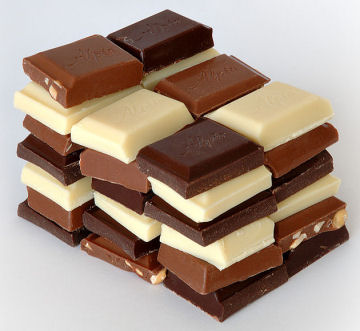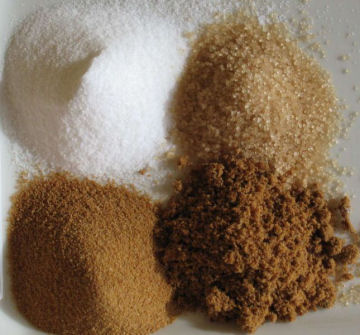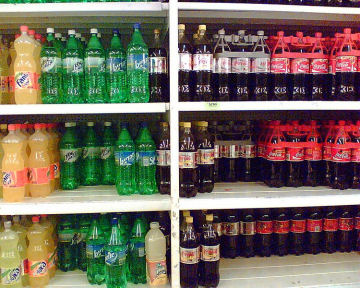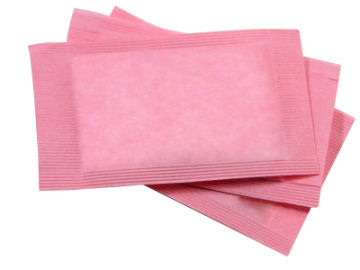Sweeeet! The skinny on sugar substitutes
Cookies, soda, candy, chocolate: IT can be hard to resist the enticement of sugary-sweet treats and drinks.
But sugar is high in calories, and eating too often of information technology can suit weight make headway and other health problems. That's wherefore millions of people drink diet sodas and eat foods that contain celluloid sweeteners in situ of kale. These synthetic chemicals gustation fresh, but they have no calories.
 |
| It can be hard to balk the enticement of chocolate and separate sweet treats. |
| André Karwath/Wikipedia |
Merely are gelt substitutes safe to use? The answer is complicated.
Sweet controversy
For as long as artificial sweeteners have been around, they've been surrounded by controversy. Some studies have suggested that they cause cancer, allergies, and other health problems, spell other studies question those findings.
It's also opaque whether feeding sugarfree foods can actually help people see to it their weight. More or less researchers even think artificial sweeteners are helping fuel a widespread dependence to sugar.
 |
| Day-to-day or diet, drinking lots of soda rump fire a unremitting want for sweets. |
| iStockphoto.com |
"The more [sweets] you get, the more you need to feel satisfied," says David L. Katz, director of the Yale-Griffin Prevention Research Center in Virgin Haven, Conn.
"So, when information technology comes time for dinner," he says, "pasta sauce without added kale tastes bland. When it's time for dessert, intense sweetness is required" for people to be happy.
Despite the debate, plenty of people continue to downward artificial sweeteners. In the United States alone, all but 200 million people ware sugarfree Oregon low-growing-calorie products, according to the Calorie Control Council, a group that represents the diet-nutrient industry. About one-half of the masses WHO consume and tope sugarfree products make a habit of it—consuming an average of quaternity such items regular.
Hoi polloi develop long preferences sure enough tastes and flavors during childhood, Katz says. So the choices you make now may affect eating habits for the respite of your aliveness.
Acquired tastes
Some flavors, so much as spicy and sour, require recitation to enjoy, and our tongues are sensitive to these tastes. Just a bolt of cayenne pepper, for instance, tush pretend a dish too fiery for more or less mass to eat. A preference for sweet, on the other hand, comes naturally. Even babies like sugar—and lots of IT.
That's because sugar is a rich source of calories, and calories provide energy. For our ancestors, craving sweet foods was an meaningful way to see that they would mystify enough energy to survive, says Eric Walters, a biochemist at Rosalind Franklin University of Medicinal drug and Science in Frederick North Chicago, Tuberculous.
 |
| Sugar comes in a variety of forms or flavors—all sweet. |
| Romain Behar/ Wikipedia |
Since more calories mean more energy, our taste buds developed a within reason high tolerance for sugar, Walters says. That substance most people can handle—and enjoy—huge doses of sweet stuff.
Artificial sweeteners stimulate the same cells in our tongues as sugar does. Thanks to the substitutes' chemistry, however, they are hundreds to tens of thousands of times A sweet as sugar. That means that far less of them is required to make something gustation sweet.
So, where a 12-ounce can of regular genus Cola contains more or less 10 teaspoons of sugar, a can of diet dope contains less than a tenth part of a teaspoonful of the painted-sweetener aspartame.
Because sugar substitutes work in so much dwarfish quantities, they ADD almost no calories to a product. That's good news to galore people on weight-reduction diets.
People with a disease named diabetes also often turn to artificial sweeteners because these products don't raise levels of wampu in the blood, as sugar does. Diabetics take over to be special thorough about controlling rakehell-sugar levels.
But cardboard sweeteners are chemicals, and they'rhenium successful in labs. Dinero, by contrast, comes from living plants. Many people are related that celluloid sweeteners, wish some other synthetic chemicals, May cause health problems. Finished the decades, the fears have waxed and waned, but questions about their safety are still debated.
Shivery sweeteners
Five artificial sweeteners are currently available in the America (and single more in other countries). Saccharin, the oldest artificial sweetener, was firstborn produced in 1879. It's sold as Sweet'N Dispirited in the United States. IT's used in diet soda, candy, and some other sugarfree products.
Some studies have linked saccharin to cancer in rodents. But other studies wealthy person shown that animals must run through the combining weight of hundreds of cans of saccharin-containing soda every day to go through any ill effects.
In the lowercase amounts that people actually consume it, Walters says, "I conceive saccharin is very, very safe."
Aspartame (which is marketed as NutraSweet or Equal and appears in products such as Dieting Coke and Diet Pepsi) has aroused quasi health concerns since it was original produced more than 40 years ago. In the all but recent scare, a group of Italian researchers found bear witness that rats fed lots of aspartame developed cancer.
 |
| People criticize chockful-sugar sodas and diet versions for antithetical reasons. |
| David Shay/Wikipedia |
A panel of 10 American scientists examined the Italian research and found major flaws. The rats exploited in the experiments, for example, were sick to start out with. And the researchers didn't keep good track of exactly how much aspartame to each one rat consumed.
The U.S. panel also reviewed much than 500 aspartame studies and concluded the substance is safe. The majority of the studies, the scientists constitute, show that an ordinary adult can eat as many as 19,400 packets of Equalized a twenty-four hour period without any standing ill effects.
"I own no question in my beware that it is safe to consume aspartame, and I'd rather consume that than the calories of a full-sugar soda," says University of Maryland toxicologist Bernadene Magnuson, a member of the review panel. She encourages her kids to adopt the like attitude.
Whatever scientists and antisweetener activists remain concerned that previous condom studies have been biased pro of artificial sweeteners. (The U.S. experts-panel study cited above, for example, was funded by a company that produces aspartame.)
"The but ones with the bonus to study [artificial sweeteners] are the companies marketing them," says Michael Jacobson, executive director director of the Center for Science in the Public Interest in American capital, D.C. "If they articulate it causes Crab, they're out of business."
Dieting food?
Millions of people have been intense artificial sweeteners for many decades, and no more diseases have broken out Eastern Samoa a result. That's pretty good evidence that these substances are in all probability painless to our health at the concentrations we eat them, Katz says.
Still, Katz himself avoids them, partly because he says in that respect's no convincing evidence that "diet" products are a full diet strategy. As a matter of fact, eating artificially sweetened foods may in reality sabotage weight-reduction efforts.
 |
| Packets of artificial sweeteners sit next to packets of sugar in many restaurants. |
| iStockphoto.com |
In a 2004 field, for example, rats that drank much of a saccharin-sugared drink ended up eating much more other solid food than did rats that had drunk same amounts of a drinkable sweetened with sugar.
What's bottom the surprising result? Mayhap, Katz says, artificial sweeteners confuse the brain's ability to connect cloying tastes with the calories in tasty foods. Thus, rats that eat a lot of sugarfree foods may end up eating more unpeasant-smelling-nutritionist's calorie foods to compensate. The same mightiness be true of people.
Katz also suspects that bathing the tongue all Clarence Shepard Day Jr. in whatever sort of sweetener—plant based or dummy—only increases desire for supersweet foods. Today, he says, to the highest degree store-bought salad dressings and pasta sauces take more sugar per gram than chocolate sirup does. We've go so utilised to the taste of these products that many people choose them to unsweetened versions. (Artificially sweetened versions of these products are now available to a fault).
Sugar, sugar everywhere . . .
Despite the questions and controversies, artificial sweeteners, like shekels, are more popular than ever. They're appearing in Thomas More and more foods, from ice ointment to jellies to cough drops. And the U.S. Intellectual nourishment and Drug Administration is reviewing flush more sugar substitutes for favorable reception.
 |
| The more sugar you exhaust, the more you probably want. |
| iStockphoto.com |
In an attempt to eat a lusty diet, Katz and his family line try to avoid sugar besides as artificial sweeteners. The effort has influenced the taste preferences of his five children.
Because his kids eat and then tiny sugar at home, Katz says, they experience sweetness clog when they eat cake or unusual sweet treats at a birthday party.
"They select one bite and then look for the waste-paper basket to spit IT out," he says, "because [to them] IT's sickeningly sweet."
Expiration Deeper:
Additional Information
Questions about the Article
Formulate Find: Sweetness Overload

0 Response to "Sweeeet! The skinny on sugar substitutes"
Post a Comment